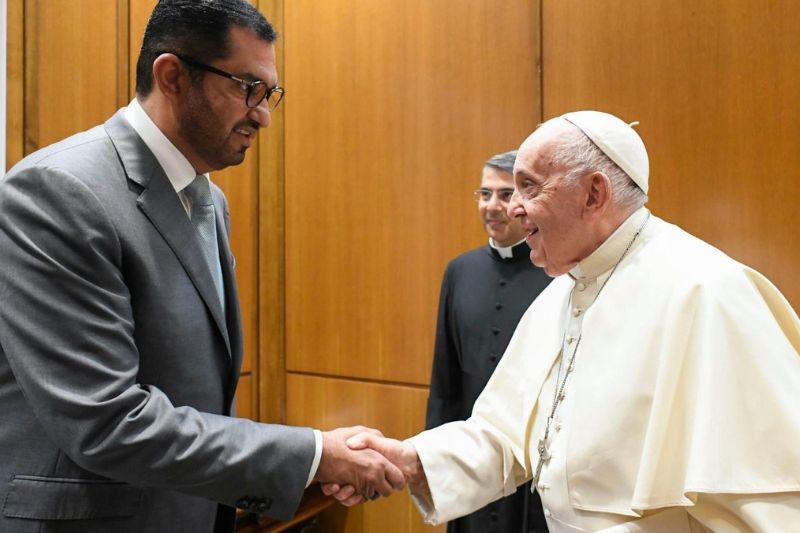Pope Francis’ Exhortation Laudate Deum, the sequel to his earlier document Laudato Si’, reminds me of Russian writer Nadezhda Mandelstam. Her two volume reflective memoirs of life in Stalin’s Russia were entitled Hope against Hope and Hope Betrayed. The darkening sequence of titles echoes the passage of her poet husband from Moscow to the Purges and Siberian exile where he died. They also recount her progressive understanding of the inhumanity of the regime and of the moral compromises so many made for survival and relative comfort.

In Laudate Deum, Pope Francis reflects on the small gains made and the increasingly urgent challenges left to address global warming. Although he remains hopeful, he assesses realistically the power of ignorance, selfishness, self-interest and timidity evident in the years since Laudato Si’.
The exhortation is written to a general audience of people of good will. It does not contain original ideas – most of the footnotes refer to Laudato Si’. At its heart is the conviction that global warming even at its present level of emissions will cause irrevocable change. This change risks being catastrophic if the level is exceeded. It will be destructive of persons and families, and particularly the most vulnerable.
In developing his argument Pope Francis describes the effects of climate change, already visible in fire and flood, and their devastation of human lives. He also emphasises the power of denial and confusion in public conversation about climate change. He recognises both the blessings brought by technical progress and its responsibility for the increase in global warming; both the authority and the provisionality of scientific modelling of the future .
Pope Francis believes that the root both of the climate crisis and of the failure to address it effectively is the assumption that infinite and unlimited growth is possible, based on technological and economic power. This view of the world sees the environment, and ultimately human persons, as resources to be exploited and not as a gift. It fails to see that we human beings are part of our environment and are responsible for its care. To exercise this responsibility we must rethink the use of power, and develop human social relationships that can regulate its use.
In the light of this theoretical background Pope Francis considers the benefits and current weakness of international multilateral institutions. They lack the power and authority needed to address international problems in the face of the claims of individual nations and corporate interests.
In writing Laudate Deum Pope Francis has in mind the November meeting in Dubai of the 28th United Nations Climate Change Conference (COP 28). He considers at some length previous conferences on climate change, highlighting the value of the Paris Conference in 2015 (COP 21) with its commitments to goals. He also recognises, however, the non-binding character of many of the proposals and the weakening of measures by national and commercial interests and by the timidity of national governments. He might have cited Australia, whose per capita emissions are far larger than most developed nations and further contributes to global warming by the mining and export of coal.

'The simultaneous publication of this Exhortation on climate change and the opening of the Synod on Synodality is not a coincidence. The key insight of synodality is that listening and conversation at all levels of the Church about its mission are central to governance. The same need for reflection at all levels of society on the values that guide technology and economic setting lies also at the heart of the response to climate change.'
Pope Francis sums up the challenge facing the participants at COP28.
‘May those taking part in the Conference be strategists capable of considering the common good and the future of their children, more than the short-term interests of certain countries or businesses. In this way, may they demonstrate the nobility of politics and not its shame. To the powerful, I can only repeat this question: “What would induce anyone, at this stage, to hold on to power, only to be remembered for their inability to take action when it was urgent and necessary to do so?’ (par 60)
In the final brief section of the document Pope Francis addresses his Catholic readers by reminding them that they are part of God’s world, our beautiful and delicate environment. In this crisis they should discern how in all their relationships to people and to the natural world they are called to contribute to healing and not heating.
Many aspects of Laudate Deum bear reflection. I shall name only four. First, its urgency. The Pope makes clear that our present practice of muddling through has a high risk of a catastrophic and irreversible level of global warming with incalculable effects on human life and civilization. Even though this risk is not certain, prudence demands that we make the reduction of emissions our central national and international goal. Otherwise we are likely find the door to safety locked before we arrive.
Second, Pope Francis insists on the vanity of believing that technology by itself can painlessly solve the problems caused by global warming. The same blind reliance on technology has produced the problem. It is essential to see technology not as a master but as a tool to be guided by human reflection on its impact on persons and on building a just society. This in turn requires public space for conversation about values. Pope Francis’ insights are not widely shared in our culture, and so require a radical change of orientation.
Third, for Pope Francis, the simultaneous publication of this Exhortation on climate change and the opening of the Synod on Synodality is not a coincidence. The key insight of synodality is that listening and conversation at all levels of the Church about its mission are central to governance. The same need for reflection at all levels of society on the values that guide technology and economic setting lies also at the heart of the response to climate change. For Pope Francis the insight will in both cases be fed by and feed the focus on relationships to the human beings at the margins of the Church and of society.
Finally, Laudate Deum combines realism and hope. In this it resembles the more sunny Net Zero Roadmap issued recently by the International Energy Agency for COP 28, which also pointed to failures to meet targets as well as to significant steps forward. In his well-informed review of this report Tim Colebatch describes it as glass half-full and half-empty, offering grounds for either hope or despair.
The Christian tradition of hope that inspires Pope Francis enters fully into the experience of hope against hope and hope betrayed, with their temptation to despair. At its heart is the story of hope in Jesus’ vision, which was tested by his friend’s betrayal and by his own dehumanising execution, but was vindicated by his inconceivable rising from the dead. Such a hope can recognise the blindness, venality, lack of attention, self-centredness, timidity and foolishness that have characterised our human response to climate change, but still work to ensure that they do not have the last word.
Andrew Hamilton is consulting editor of Eureka Street, and writer at Jesuit Social Services.
Main image: Pope Francis shakes hands with Dr. Sultan Ahmed Al Jaber, President-designate of COP28 (Vatican Media)